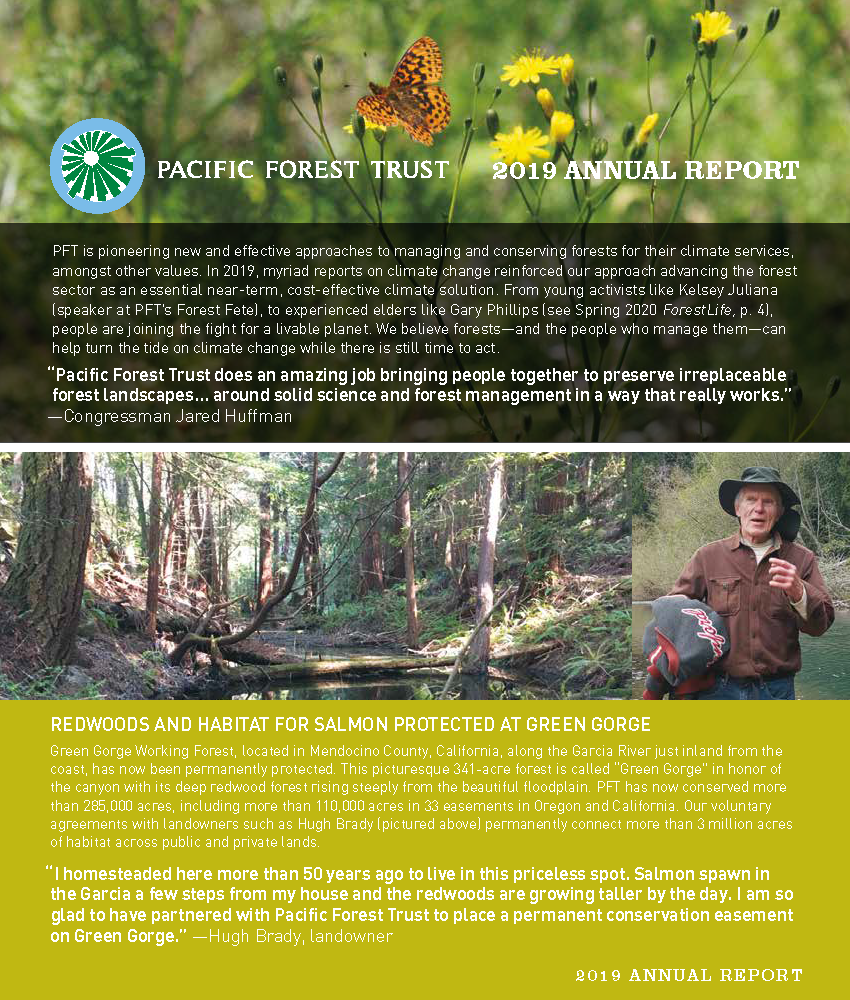
“Pacific Forest Trust does an amazing job bringing people together to preserve irreplaceable forest landscapes… around solid science and forest management in a way that really works.”
—Congressman Jared Huffman
REDWOODS AND HABITAT FOR SALMON PROTECTED AT GREEN GORGE
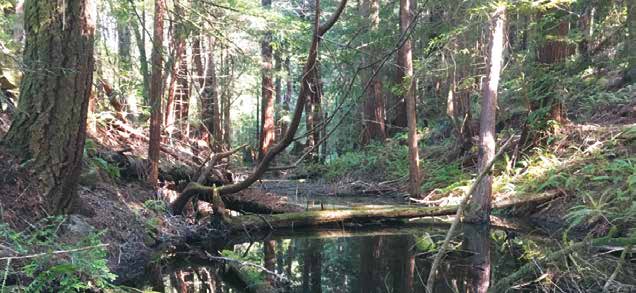 Green Gorge Working Forest, located in Mendocino County, California, along the Garcia River just inland from the coast, has now been permanently protected. This picturesque 341-acre forest is called “Green Gorge” in honor of the canyon with its deep redwood forest rising steeply from the beautiful floodplain. PFT has now conserved more than 285,000 acres, including more than 110,000 acres in 33 easements in Oregon and California. Our voluntary agreements with landowners such as Hugh Brady (pictured above) permanently connect more than 3 million acres of habitat across public and private lands.
Green Gorge Working Forest, located in Mendocino County, California, along the Garcia River just inland from the coast, has now been permanently protected. This picturesque 341-acre forest is called “Green Gorge” in honor of the canyon with its deep redwood forest rising steeply from the beautiful floodplain. PFT has now conserved more than 285,000 acres, including more than 110,000 acres in 33 easements in Oregon and California. Our voluntary agreements with landowners such as Hugh Brady (pictured above) permanently connect more than 3 million acres of habitat across public and private lands.
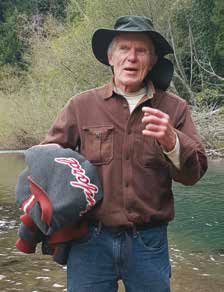
“I homesteaded here more than 50 years ago to live in this priceless spot. Salmon spawn in the Garcia a few steps from my house and the redwoods are growing taller by the day. I am so glad to have partnered with Pacific Forest Trust to place a permanent conservation easement on Green Gorge.” —Hugh Brady, landowner
MODELING CLIMATE ON WILDLIFE IN KEY WATERSHED AREAS
 The California Wildlife Conservation Board awarded PFT a $400,000 grant in 2019 to work with both the University of California and Duke University to model the impacts of climate change on the five key source watersheds in northern California, those that provide the vast majority of drinking and irrigated agricultural water in the state. This region is also critically important for wildlife adaptation and fresh water for San Francisco Bay. Building on PFT’s Risk Assessment (pacificforest.org/risk) for the region, this analysis will identify priorities and strategies for promoting wildlife adaptation through restoration and conservation in the region.
The California Wildlife Conservation Board awarded PFT a $400,000 grant in 2019 to work with both the University of California and Duke University to model the impacts of climate change on the five key source watersheds in northern California, those that provide the vast majority of drinking and irrigated agricultural water in the state. This region is also critically important for wildlife adaptation and fresh water for San Francisco Bay. Building on PFT’s Risk Assessment (pacificforest.org/risk) for the region, this analysis will identify priorities and strategies for promoting wildlife adaptation through restoration and conservation in the region.
OREGON ON THE VERGE OF HISTORY
 Building on its work over the past several years to enact climate policy that leverages the power of forests, PFT worked hard to help shape and pass Oregon’s HB 2020. While it did not pass, it laid critical groundwork for future efforts. We engaged a broad coalition of groups to integrate rural and urban climate concerns by making natural and working lands—and their owners and managers—a key part of that policy. We were pleased to work with companies such as Green Diamond Resource Company, GreenWood Resources, Hancock Timber Resource Group, and Port Blakely, who publicly supported the bill. At year end, the legislature was again seeking to pass such legislation that would help Oregon’s rural communities on the front lines of climate change and invest in more climate-resilient landscapes.
Building on its work over the past several years to enact climate policy that leverages the power of forests, PFT worked hard to help shape and pass Oregon’s HB 2020. While it did not pass, it laid critical groundwork for future efforts. We engaged a broad coalition of groups to integrate rural and urban climate concerns by making natural and working lands—and their owners and managers—a key part of that policy. We were pleased to work with companies such as Green Diamond Resource Company, GreenWood Resources, Hancock Timber Resource Group, and Port Blakely, who publicly supported the bill. At year end, the legislature was again seeking to pass such legislation that would help Oregon’s rural communities on the front lines of climate change and invest in more climate-resilient landscapes.
WE’VE BEEN (ALMOST) EVERYWHERE
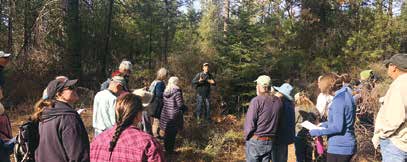 In 2019, Pacific Forest Trust took our show on the road. Among many events, we testified in the California Legislature, participated in the California Wildfires panel held by Capitol Weekly in Sacramento and a “Science on Tap” lecture in Portland; we presented at the Natural Climate Solutions Symposium for California, Oregon, and Washington; the Northwest Business & The Environment Conference in Portland; and the Carbon-Friendly Forestry Conference, which we co-hosted with the Washington Environmental Council (WEC) in Seattle. We also hosted several tours of our conserved properties, including McCloud Soda Springs, pictured above. For video of a number of our appearances, visit our YouTube page.
In 2019, Pacific Forest Trust took our show on the road. Among many events, we testified in the California Legislature, participated in the California Wildfires panel held by Capitol Weekly in Sacramento and a “Science on Tap” lecture in Portland; we presented at the Natural Climate Solutions Symposium for California, Oregon, and Washington; the Northwest Business & The Environment Conference in Portland; and the Carbon-Friendly Forestry Conference, which we co-hosted with the Washington Environmental Council (WEC) in Seattle. We also hosted several tours of our conserved properties, including McCloud Soda Springs, pictured above. For video of a number of our appearances, visit our YouTube page.
LEADING THE WAY FOR THE COUNTRY
PFT’s work developing practical climate policies established a national model—over 7 million acres across 28 states are now engaged in developing forest carbon offsets—and has advanced collaboration and cooperation between states on how forest and other lands can be integrated into climate action on the ground. Oregon recently joined an agreement between California, Washington, and British Columbia to collaborate on advancing the use of forests to help climate that had its roots at PFT’s 2018 Global Climate Action Summit event. PFT also worked with the Land Trust Alliance to help develop a national strategy for land trusts and others to engage in advancing the twinned goals of a healthy climate and land conservation.
“The impacts of climate change don’t stop at state or national boundaries, and neither can our work.”
—Washington State Commissioner of Public Lands Hilary Franz
CLIMATE-SMART WATER SECURITY
 The healthy, resilient function of California’s key source watersheds is critical to the state’s water security in a radically changing climate. In 2019, PFT led the way for major advances in landscape-level protection and restoration for these five watersheds (the Feather, Pit, McCloud, Upper Sacramento, and Upper Trinity). Leveraging Governor Gavin Newsom’s Executive Order to build a Water Resilience Portfolio, PFT developed a plan to restore these watersheds over the next 15 years and built support among stakeholders for this suite of actions (find out more at pacificforest.org/wrp). We testified in the Legislature; met with County Supervisors, planners, and federal and private landowners and land managers; and worked with multiple partners, from the Sierra Meadows Partnership to our Klamath Cascade Advisory Council. We also established an office in the region to increase community engagement. Our work to promote a new “infrastructure approach” to watersheds was also recognized nationally by its inclusion in the December special issue on Conservation Finance of IMPACT, the journal of the American Water Resources Association, as well as in western region convenings. This work was supported in part by a $225,000 grant from the Healthy Watersheds Consortium (funded by the U.S. Endowment for Healthy Forests and Communities, US EPA, and NRCS). Read more about our Healthy Watersheds California program at pacificforest.org/hwc.
The healthy, resilient function of California’s key source watersheds is critical to the state’s water security in a radically changing climate. In 2019, PFT led the way for major advances in landscape-level protection and restoration for these five watersheds (the Feather, Pit, McCloud, Upper Sacramento, and Upper Trinity). Leveraging Governor Gavin Newsom’s Executive Order to build a Water Resilience Portfolio, PFT developed a plan to restore these watersheds over the next 15 years and built support among stakeholders for this suite of actions (find out more at pacificforest.org/wrp). We testified in the Legislature; met with County Supervisors, planners, and federal and private landowners and land managers; and worked with multiple partners, from the Sierra Meadows Partnership to our Klamath Cascade Advisory Council. We also established an office in the region to increase community engagement. Our work to promote a new “infrastructure approach” to watersheds was also recognized nationally by its inclusion in the December special issue on Conservation Finance of IMPACT, the journal of the American Water Resources Association, as well as in western region convenings. This work was supported in part by a $225,000 grant from the Healthy Watersheds Consortium (funded by the U.S. Endowment for Healthy Forests and Communities, US EPA, and NRCS). Read more about our Healthy Watersheds California program at pacificforest.org/hwc.
PFT ON OREGON GOVERNOR’S COUNCIL ON WILDFIRE RESPONSE
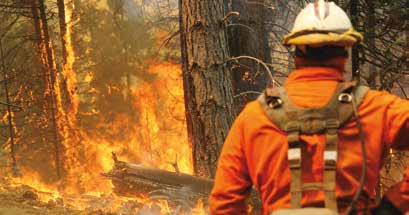 PFT was an active member of Oregon Governor Kate Brown’s Council on Wildfire Response, specifically on its Suppression and Mitigation committees. PFT advocated for strategic, climate-smart fire management, incorporating both prescribed burning and managed natural fires where these can be done safely. The Council delivered its final recommendations in November, noting that 13 million acres of land in Oregon is at high risk of wildfire. The Council’s roadmap will help develop support for funding the needed work of community adaptation and landscape restoration, including the re-establishment of a more natural fire regime.
PFT was an active member of Oregon Governor Kate Brown’s Council on Wildfire Response, specifically on its Suppression and Mitigation committees. PFT advocated for strategic, climate-smart fire management, incorporating both prescribed burning and managed natural fires where these can be done safely. The Council delivered its final recommendations in November, noting that 13 million acres of land in Oregon is at high risk of wildfire. The Council’s roadmap will help develop support for funding the needed work of community adaptation and landscape restoration, including the re-establishment of a more natural fire regime.
EXPANDING CAPACITY IN OREGON
PFT’s conservation projects are often large-scale and complex, and involve collaboration with multiple public and private partners. Thanks to a three-year grant from the M.J. Murdock Charitable Trust, PFT has expanded our conservation capacity by adding a new position based in Portland. Wendy Gerlach, an attorney with deep experience and strong passion for conservation, joined us as Senior Conservation Project Manager. Through engaging with landowners, agencies, stakeholders and other partners, she will leverage our 27 years of experience to expand forest conservation in Oregon and regionally.
RESTORING A CRITICAL LANDSCAPE FOR YOSEMITE NATIONAL PARK
 Forests deserve lots of TLC—time, labor and creativity—especially after the impacts of a devastating fire. PFT’s Henness Ridge forests adjacent to Yosemite National Park were heavily impacted by 2018’s deadly Ferguson Fire. In 2019, we began preparing for restoration, removing hazard trees and reducing the high density of brush to restore the magnificent conifer forest. For more of the story, see the Spring 2020 issue of Forest Life (p. 12).
Forests deserve lots of TLC—time, labor and creativity—especially after the impacts of a devastating fire. PFT’s Henness Ridge forests adjacent to Yosemite National Park were heavily impacted by 2018’s deadly Ferguson Fire. In 2019, we began preparing for restoration, removing hazard trees and reducing the high density of brush to restore the magnificent conifer forest. For more of the story, see the Spring 2020 issue of Forest Life (p. 12).
ADVANCING A FOREST AND LAND SECTOR IN CALIFORNIA
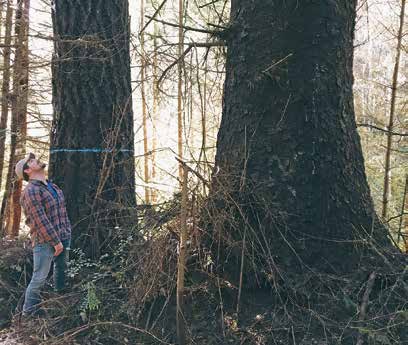 PFT has been working closely with the California Air Resources Board (CARB) since 2006 to advance how forests are managed to reduce net CO2 emissions. Last year, in response to CARB Chair Mary Nichols’ direction to significantly increase investments in forest and land to mitigate climate change, PFT provided recommendations for how the state can ramp up actions to manage for climate-resilient and carbon-rich landscapes through market and regulatory mechanisms. Read PFT’s recommendations at pacificforest.org/carb.
PFT has been working closely with the California Air Resources Board (CARB) since 2006 to advance how forests are managed to reduce net CO2 emissions. Last year, in response to CARB Chair Mary Nichols’ direction to significantly increase investments in forest and land to mitigate climate change, PFT provided recommendations for how the state can ramp up actions to manage for climate-resilient and carbon-rich landscapes through market and regulatory mechanisms. Read PFT’s recommendations at pacificforest.org/carb.
“PFT has been a great partner… working actively to manage our forests in ways that make them good stewards of carbon.” —CARB Chair Mary Nichols
CONSERVING THE ELLIOTT STATE FOREST IN A NEW (BUT PROVEN) WAY
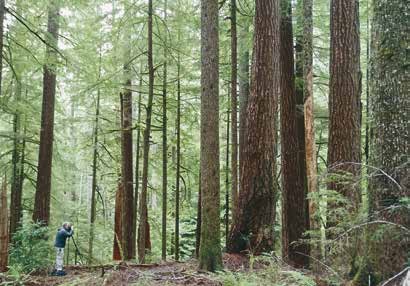 Oregon’s Elliott State Forest has been the focus of major public debate and concern. In 2019, the state sold $100M in bonds (approved in 2017) to protect the remarkable conservation values of this forest, including its almost 40,000 acres of old forest, while still maintaining sustainable management. PFT worked with many advocates, scientists, and others to urge the Oregon State Land Board to use the public’s $100 million investment to protect this precious resource in perpetuity under a Working Forest Conservation Easement (WFCE).
Oregon’s Elliott State Forest has been the focus of major public debate and concern. In 2019, the state sold $100M in bonds (approved in 2017) to protect the remarkable conservation values of this forest, including its almost 40,000 acres of old forest, while still maintaining sustainable management. PFT worked with many advocates, scientists, and others to urge the Oregon State Land Board to use the public’s $100 million investment to protect this precious resource in perpetuity under a Working Forest Conservation Easement (WFCE).
PFT’s work relies on the generous support of individuals, foundations, and corporations. To help Pacific Forest Trust ensure water security, provide homes for wildlife, boost rural economies, and conserve carbon-rich, climate-resilient forests, please visit pacificforest.org/support-pft.


